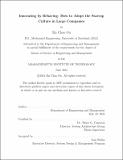Innovating by Behaving: How to Adopt the Startup Culture in Large Companies
Author(s)
Ou, Shi Chao
DownloadThesis PDF (3.523Mb)
Advisor
Cameron, Bruce G.
Terms of use
Metadata
Show full item recordAbstract
Increasingly, large company leaders want their organizations to act like startups! They want to take action against the threat of disruption by startups. They see many industries disrupted by startups, as evident by the rise of Airbnb and SpaceX. Rather than waiting to be disrupted, business leaders want their research \& development divisions to act like startups. Yet, many companies with their attempts to build an internal startup innovation environment report challenges. These challenges are the symptoms of innovation tensions, tensions that business leaders should manage to foster a startup culture within the corporate innovation culture.
This work identifies a set of eleven innovation management rules for business leaders to manage these tensions experienced by individual intrapreneurs and innovation teams. In developing these rules, each startup and corporate innovation mentality is categorized using the Affective, Behavioral and Cognitive (ABC) model of attitude and the Galbraith Star Model. With these categorizations, the negative psychological effects of these mentalities are analyzed further to understand the brutal side of the innovation culture. Based on innovative behaviors collected in the literature research and a set of eleven interviews, startup and corporate innovation cultures are modeled as a system of interdependent behaviors in causal loop diagrams to expose unknown and undesirable tensions. These tensions expose a set of root causes of the challenges in fostering a startup culture in large companies. In addition to managing these tensions, business leaders are forced to make compromised strategic choices given the innovation paradoxes in intrapreneurs’ risk versus reward profile and the willingness to fire incompetent intrapreneurs.
These tensions and paradoxes confirm that the corporate-startup innovation culture is paradoxical, and it is not sustainable from a psychological perspective. Yet, with these mental models of the innovation culture and these eleven innovation management rules, business leaders are better prepared to manage the brutal side of the innovation culture while leading the next disruption in their industries.
Date issued
2021-06Department
System Design and Management Program.Publisher
Massachusetts Institute of Technology